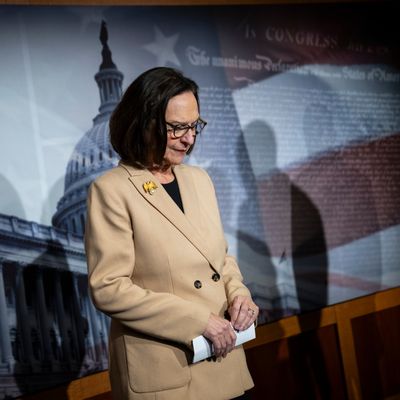

Is Deb Fischer in trouble back home?
Photo: Graeme Sloan/Bloomberg/Getty Images
The staid, conservative heartland state of Nebraska has been the unlikely locus of a lot of political drama this year. Off and on again, until they finally threw in the towel this week, key Republicans there led by the governor tried to change how the state distributes its five electoral votes. The current system awards a vote to winners of congressional districts, but Republicans tried to switch it to a winner-take-all system like that of 48 other states (Maine being the other exception). The net effect would have almost certainly been to give Donald Trump an extra electoral vote.
But it’s a different issue that is keeping Nebraska in the political news as Election Day approaches: stubborn evidence that two-term incumbent Republican senator Deb Fischer is in a much closer-than-anticipated race with independent candidate Dan Osborn.
Osborn was described by Slate’s David Faris as “a Navy veteran who looks and sounds as if he were designed in a lab to reverse Democrats’ fortunes with non–college educated white voters.” He’s a big union guy and is pro-choice but is conservative on guns and immigration. More importantly, he has kept his distance from the unpopular national and state Democratic Parties (which aren’t fielding their own candidate against Fischer) and won’t say with whom he would caucus if he wins. He’s benefiting somewhat from the strength of the indie brand in Nebraska; this is the state where the unicameral legislature is formally nonpartisan (though informally Republicans control it).
For whatever reason, Nebraska’s sparse polling shows this race as far more competitive than you would expect, as The Hill reports:
[A] recent poll from SurveyUSA/Split Ticket showed Fischer running neck and neck with Osborn, raising eyebrows among political observers and leading some to wonder just how competitive the race might turn out to be….An Osborn-sponsored YouGov survey released last month shows Fischer at 43 percent and Osborn at 41 percent, and a July poll from Red Wave Strategy Group/Impact Research puts the pair at 42 percent each …
“At some point, those of us who observe Nebraska politics are going to have to take seriously that this actually is a tight race,” said Kevin Smith, a political science professor at the University of Nebraska–Lincoln. “I’m coming around to the view that maybe the race is on for that Senate seat, which is a little shocking, given that, in statewide races, Republicans have dominated for years and years.”
The Fischer camp (which sponsored its own poll in July showing the incumbent comfortably ahead), scoffed at the idea she’s in any trouble. She does have a robust fundraising lead and hasn’t accepted Osborn’s debate challenges. It is a bit mysterious that she would be so vulnerable. Fischer is a largely colorless 73-year-old conventional conservative from a ranching background who won her original primary in 2012 when the two front-runners basically destroyed each other and went on to dispatch Nebraska Democratic legend Bob Kerrey easily in the general election. Still, she’s had meh job-approval numbers in the past.
It’s possible Fischer’s shaky numbers could lead to a national Republican “rescue mission” like the big effort the GOP made in 2014 in neighboring Kansas when Pat Roberts was running poorly against independent Greg Orman (Roberts wound up winning by ten points). By forcing Republicans to deploy resources they’d prefer to utilize in Senate battleground states like Montana or Ohio, Osborn could help Democrats nationally even if he loses while disdaining the Donkey Party.
But with or without an intervention, the odds are good that Fischer will prevail in the end. Presidential years in this era of robust straight-ticket voting aren’t the best environment for candidates who aren’t part of the presidential winner’s party in any given state. Trump won Nebraska by 25 points in 2016 and 19 points in 2020. All the Nebraska polls show a large undecided vote, and all other things being equal, undecideds tend to break against the party that controls the White House, particularly in down-ballot races with an incumbent running.
Aside from the Orman-Roberts race in Kansas, the best example of an indie backed quietly by Democrats making a race of it in a deep-red state was in 2022 in Utah, where Evan McMullin put a scare into incumbent GOP Senator Mike Lee. There were all sorts of special circumstances in that race: McMullen was a national symbol for Never Trump conservative Republicans, having won 22 percent of Utah’s vote as an independent presidential candidate in 2016. By 2022, Lee had moved from being keeping his distance from Trump to being a Trump sycophant, which didn’t go over well in Utah, whose LDS-majority electorate held a dim view of the 45th president’s personal character. Polls showed McMullin trailing Lee by under ten points. But in the end, party discipline held and Lee won by 11 points.
So the precedents don’t bode well for an indie upset in Nebraska this year. It probably doesn’t help Osborn either that the presidential campaigns are active in Nebraska, thanks to the second congressional district’s EV-awarding status, which will boost partisan polarization statewide. And on top of everything else, Fischer shares a ticket with former governor Pete Ricketts in a special Senate election being held to complete the term of Ben Sasse, who resigned from the Senate last year; Ricketts is running against a weak Democratic candidate. So despite the close polls, the Cook Political Report and Sabato’s Crystal Ball still rate the race as safely in the bag for Fischer. But it’s worth keeping an eye on Nebraska on Election Night, as the GOP can’t afford a slipup in its drive to gain one net seat and flip the Senate.
Source link




